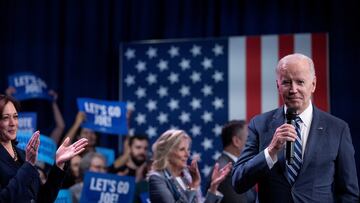What impact on the US economy can the midterm elections have? What to expect with a divided government
It’s looking like there will be a divided Congress which will halt Democrat plans for future legislation.


A lot of analysts were expecting a resounding Republican win in these midterm elections. They were to comfortably prise both the Senate and the House away from the Democrats, meaning they could hamstring all of President Joe Biden’s plans until the next presidential election.
Instead, there is a strong possibility the Democrats will hold on to the Senate and the House remains a toss-up, with a slight Republican advantage. While it is somewhat of a success for the Democrats to not take a battering, especially when the high inflation is taken into account, Republican control of either of the legislative arms would almost certainly kill any slightly progressive economic measures.
“They said no one cared about democracy. They said the abortion issue had faded away, that the only thing voters care about is the economy. They were all wrong.”
— Mehdi Hasan (@mehdirhasan) November 11, 2022
My first post-midterms @MehdiHasanShow monologue, detailing what the pundits missed. Watch:pic.twitter.com/qkB5ndQVsY
“A narrow Republican victory in the House would spell the end for President Joe Biden’s domestic agenda, and the potential for further big shifts in fiscal policy,” said Andrew Hunter, senior US economist at Capital Economics, in a research note. “It would also raise the risks of another crisis over the Federal debt ceiling next summer.”
In the immediate aftermath stocks on the Dow Jones dropped 646.89 points, or about 1.95%, to 32,513.94. However, this also coincided with Disney missing analyst estimates as well as further turmoil for cryptocurrency holders.
Catch up on election night:
Expect spending to be reduced
Preventing the Democrats from control all arms of government would give Republicans greater power to dictate economic policy. Even with a slight majority in the Senate as well as the House majority the Democrats found it very difficult to get President Biden’s spending plans through. With risks of a recession looming the government would be hoping that they could pass bills to address any future problem swiftly. With the loss of one this will be nigh impossible, at least with how the Democrats would want to conquer such crisis.
“The House majority will likely be 10 seats or less for either party, which makes governing challenging at best. The midterms have essentially resulted in gridlock,” Brian Gardner, chief Washington policy strategist at investment bank Stifel, wrote in an analysis.
This is reflected in a budget analysis published by the Republican Study Committee (RSC) this year. It suggests the Republicans want to “reduce spending by $14.4 trillion over 10 years” as well as “build off of the pro-growth tax and regulatory policies” of the former president, Donald Trump, simply code for cut taxes on businesses. This is immediately at odds with the Democrat agenda in Congress which is aiming to increase taxes on America’s richest. This will be impossible to achieve with a stronger Republican Congress.
That's a pretty narrow margin on inflation given D control of WH and Congress. Maybe Rs hurt by complete lack of a plan? https://t.co/0RwUrljbzH pic.twitter.com/f4vxntoZnn
— Paul Krugman (@paulkrugman) November 9, 2022
What about the debt ceiling?
An area where Republicans would be able to flex their new fiscal power would be to the debt ceiling. This is the limit that Congress imposes on the federal government, ensuring that the government cannot borrow more than a certain amount. If government were to exceed it without Congress passing a raise or suspension the government could default on its debts, which has never before happened in US history.
Related stories
This would be the case even if the Democrats hold on to the Senate as the borrowing limit bill will need to be ratified by the House of Representatives. Controlling the lower House would allow Republicans to deny a debt ceiling increase and force the Democrats to reduce their spending instead of borrowing.
The last time negotiations were held on the federal government’s borrowing limit was December 2021. That was managed to be passed thanks to the 50-50 split in the Senate as well as the Democrat control of the House. That increased the ceiling until 2023.

